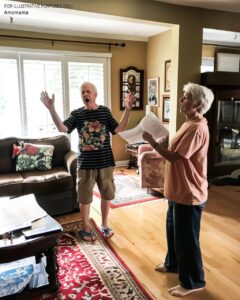
When Jason’s estranged parents showed up demanding his house, I found myself in an unexpected battle. Grieving and resolute, I agreed to consider their claim, but only if they could answer a question that haunted Jason until his final days.
Jason and I met when we were 17. He arrived at my door, heartbroken and homeless after being thrown out by his parents. My mom welcomed him without hesitation, and from that day on, he was family.
We supported each other through high school and college. While I went into HR, he excelled with computers. Four years ago, our world shattered when Jason was diagnosed with bone cancer. I juggled extra work to cover the mortgage and medical bills, while Jason hoped his parents might reconcile. They never did.
Jason’s funeral was barely a month ago when his family arrived unannounced, demanding the house he had bought. Susan, his mother, greeted me with a false sympathy, while Charles, his father, spoke coldly about the property.
“Jason was our son, and this house should be ours now,” Charles said.
I was stunned. “Jason bought this house. It’s in my name.”
Their lawyer, a silent observer, explained, “Legally, his parents have a claim to the property as his next of kin.”

I was furious. “You didn’t care about him when he was alive, and now you want to take what’s his? You can buy it from me for what I paid plus the mortgage I’ve covered.”
Charles’s threatening tone came through. “You know we can’t afford that. Transfer the mortgage, or we’ll see you in court.”
I remained firm. “Before you proceed, answer one question.”
They hesitated. I retrieved an envelope from a drawer. “This is Jason’s final letter to you.”
Susan’s eyes lit up with greed. “A letter? What does it say?”
I handed it to her. “Read it and find out.”
She read aloud as their expressions shifted from anticipation to anger. The letter was a message of forgiveness from Jason: “I’m sorry I wasn’t the son you wanted. I’ve learned to forgive you and hope you can forgive yourselves.”
The room fell silent. Susan’s face twisted with disappointment. “This isn’t what we expected.”
I couldn’t help but smile. “Jason left you his forgiveness. You came here to claim what wasn’t yours. He left you nothing more than this letter.”
Charles’s anger flared. “You think you’re so righteous?”
“No,” I replied. “But I was there for Jason when you weren’t. I held his hand and gave him a home. If you want this house, answer me honestly: Why did you abandon him? Why ignore his attempts to reconcile?”
Susan’s response was a hollow excuse: “He didn’t meet our expectations, so we thought it best to let him live without us.”
Their lack of remorse was evident. I shook my head. “That’s not good enough.”
The lawyer intervened. “It’s best we leave. There’s nothing more to be done.”
Defeat was clear in their eyes as they left, their footsteps echoing in the quiet hallway. I watched them drive away, feeling a mix of sorrow and relief.
Jason was gone, but I had protected his memory from those who didn’t deserve it. The house was ours, a sanctuary for his memory. As I locked the door, it was a quiet affirmation of everything I fought for. Jason’s legacy would remain alive within these walls and my heart.





